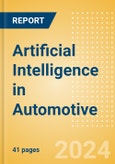AI has revolutionized the automotive sector
Artificial intelligence (AI) refers to software-based systems that use data inputs to make decisions on their own. According to the analyst forecasts, the total AI market, including software, hardware, and services, will be worth $1.03 trillion in 2030, having grown at a compound annual growth rate (CAGR) of 39.1% from $103.0 billion in 2023. AI has transformed every aspect of the automotive value chain from supplier networks to sale and post-sale activity. The integration of AI across the sector has massively boosted efficiency, innovation, and product quality.GenAI is being integrated throughout the value chain
Generative AI is being incorporated into vehicles by several large original equipment manufacturers (OEMs) to enhance the customer experience. Generative AI, or GenAI, integrates into voice assistants to provide drivers with more natural, enriching conversations as well as improving overall functionality. OEMs such as Volkswagen have incorporated ChatGPT into their voice assistants, giving the vehicles new capabilities such as temperature control, enhanced navigation, or general knowledge. GenAI has also been used on the retail side of the automotive industry. Chatbots and virtual sales assistants allow dealerships to handle customer queries with efficiency and give customers tailored suggestions, up-to-date vehicle knowledge, and even financing.AI is the key to developing autonomous vehicles
Machine learning (ML), computer vision, and natural language processing (NLP) are all integral parts of autonomous vehicle (AV) development. Machine learning is used to train AVs to recognize patterns in sensor data, make decisions, and improve their performance over time. Computer vision algorithms are used to process visual data from cameras and other sensors to detect and classify objects, such as pedestrians, vehicles, and road signs. NLP allows AVs to understand commands, provide information, and communicate intentions, enhancing the overall user experience and safety of the vehicle. AI is the key to making sure AVs not only function but also adhere to regulations regarding vehicle and passenger safety.Scope
- This report provides an overview of the Artificial Intelligence theme. The detailed value chain comprises five layers: hardware,Data Management, Foundational AI, Advanced AI capabilities, and Delivery. Leading and challenging vendors are identified across OEMs, Supplier networks, and Specialist vendors.
- It identifies automotive challenges, such as ESG, CASE megatrends, geopolitics, digital transformation, and supply chain disruption, and an impact assessment of Artificial Intelligence on the automotive industry, addressing these challenges.
- Several case studies are included to analyze the multiple ways companies have responded to the impact of this theme’s growth and what they are doing to grow with this theme.
Reasons to Buy
- This report will help you to understand Artificial Intelligence and its impact on the automotive sector.
- Benchmark your company against your competitors and assess how automotive companies are utilizing Artificial Intelligence to drive revenues.
- Identify attractive investment targets by understanding which companies are most advanced in the themes that will determine future success in the automotive industry.
- Understand key industry challenges and where Artificial Intelligence use cases are most useful.
- Develop and design your corporate strategies through an in-house expert analysis of Artificial Intelligence by understanding the primary ways in which this theme is impacting the automotive industry.
- Position yourself for future success by investing in the right Artificial Intelligence technologies.
Table of Contents
- Executive Summary
- Players
- Artificial Intelligence Value Chain
- The Impact of Artificial Intelligence on Automotive
- Case Studies
- Market Size and Growth Forecasts
- Artificial Intelligence Timeline
- Signals
- Companies
- Sector Scorecard
- Glossary
- Further Reading
- Thematic Research Methodology
- About the Analyst
- Contact the Publisher
Companies Mentioned (Partial List)
A selection of companies mentioned in this report includes, but is not limited to:
- BMW
- Ford
- Mercedes-Benz
- Tesla
- Ferrari
- Toyota
- Kia
- Hyundai
- Chery
- Changan Automobiles
- Mazda
- Suzuki
- Robert-Bosch
- Continental AG
- Schaeffler
- Nvidia
- Denso
- Pony.AI
- Waymo
- Horizon Robotics
- Nvidia
- Intel
- Cerence
- Helm.ai
- Genesys
- Intel
- Volkswagen
- OpenAI
- Seez
- IBM
- Alphabet
- Samsung Electronics
- Microsoft
- Baidu
- Yamaha Motor Co
- ARBE Robotics
- BAIC
- Aptiv
- GM
- BYD
- Amazon
- Horizon Robotics
- Pony.AI








